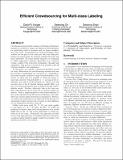Efficient crowdsourcing for multi-class labeling
Author(s)
Karger, David R.; Oh, Sewoong; Shah, Devavrat
DownloadKarger_Efficient crowdsourcing.pdf (370.8Kb)
OPEN_ACCESS_POLICY
Open Access Policy
Creative Commons Attribution-Noncommercial-Share Alike
Terms of use
Metadata
Show full item recordAbstract
Crowdsourcing systems like Amazon's Mechanical Turk have emerged as an effective large-scale human-powered platform for performing tasks in domains such as image classification, data entry, recommendation, and proofreading. Since workers are low-paid (a few cents per task) and tasks performed are monotonous, the answers obtained are noisy and hence unreliable. To obtain reliable estimates, it is essential to utilize appropriate inference algorithms (e.g. Majority voting) coupled with structured redundancy through task assignment. Our goal is to obtain the best possible trade-off between reliability and redundancy. In this paper, we consider a general probabilistic model for noisy observations for crowd-sourcing systems and pose the problem of minimizing the total price (i.e. redundancy) that must be paid to achieve a target overall reliability. Concretely, we show that it is possible to obtain an answer to each task correctly with probability 1-ε as long as the redundancy per task is O((K/q) log (K/ε)), where each task can have any of the $K$ distinct answers equally likely, q is the crowd-quality parameter that is defined through a probabilistic model. Further, effectively this is the best possible redundancy-accuracy trade-off any system design can achieve. Such a single-parameter crisp characterization of the (order-)optimal trade-off between redundancy and reliability has various useful operational consequences. Further, we analyze the robustness of our approach in the presence of adversarial workers and provide a bound on their influence on the redundancy-accuracy trade-off.
Unlike recent prior work [GKM11, KOS11, KOS11], our result applies to non-binary (i.e. K>2) tasks. In effect, we utilize algorithms for binary tasks (with inhomogeneous error model unlike that in [GKM11, KOS11, KOS11]) as key subroutine to obtain answers for K-ary tasks. Technically, the algorithm is based on low-rank approximation of weighted adjacency matrix for a random regular bipartite graph, weighted according to the answers provided by the workers.
Date issued
2013-06Department
Massachusetts Institute of Technology. Department of Electrical Engineering and Computer ScienceJournal
ACM SIGMETRICS Performance Evaluation Review
Publisher
Association for Computing Machinery (ACM)
Citation
Karger, David R., Sewoong Oh, and Devavrat Shah. “Efficient Crowdsourcing for Multi-Class Labeling.” SIGMETRICS Perform. Eval. Rev. 41, no. 1 (June 14, 2013): 81.
Version: Author's final manuscript
ISSN
01635999